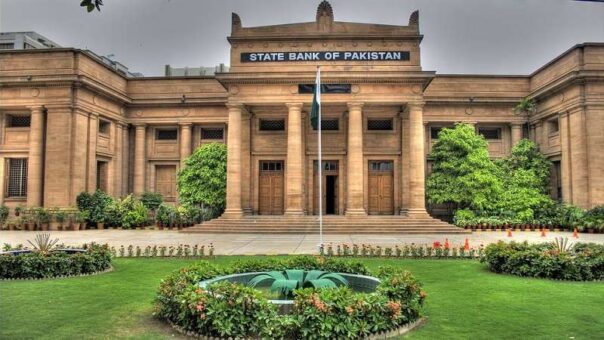Karachi, September 5, 2023 – The State Bank of Pakistan (SBP) has released data indicating a significant surge in the central government’s total debt, which has reached an alarming Rs 61.75 trillion in July 2023.
This represents a staggering year-on-year increase of 22.11 percent, compared to the Rs 50.57 trillion recorded in July 2022.
On a monthly basis, the central government’s debt witnessed a sequential increase of 1.49 percent compared to Rs 60.84 trillion in June 2023. This mounting debt burden can be largely attributed to extensive borrowing from both domestic and foreign sources, primarily to cover the fiscal deficit.
The SBP’s data breakdown reveals that the majority of the debt, amounting to Rs 39.02 trillion, has been incurred domestically, marking a remarkable year-on-year growth of 24.08 percent. This domestic debt includes Rs 29.59 trillion in long-term debt and Rs 9.29 trillion in short-term debt, with the remaining Rs 22.73 trillion originating from external sources.
By the end of July 2023, the government’s long-term debt had surged by 24.44 percent year-on-year to reach Rs 29.59 trillion, compared to Rs 23.78 trillion in the same period a year ago. Similarly, short-term debt increased by 27.14 percent year-on-year, rising from Rs 7.31 trillion in July 2022.
Within the long-term domestic debt category, Pakistan Investment Bonds (PIBs) accounted for a substantial Rs 22.06 trillion, witnessing a year-on-year increase of 27.40 percent. Meanwhile, Market Treasury Bills (MTBs) constituted Rs 9.22 trillion in the short-term domestic debt, marking a 27.14 percent year-on-year increase.
Borrowings through Naya Pakistan Certificates also saw a significant rise of 26.71 percent year-on-year, reaching Rs 139 billion in July 2023. Examining the central government’s external debt, approximately Rs 22.67 trillion was sourced from long-term loans, with Rs 65.2 billion stemming from short-term loans.
The country’s total debt and liabilities recorded a staggering 29 percent increase, reaching Rs 77.1 trillion in the last fiscal year of 2022/23. This marked a substantial rise from Rs 59.772 trillion in the previous fiscal year. As a percentage of GDP, the total debt and liabilities surged to 91.1 percent in 2022/23. Notably, the nation’s debt rose by 28.4 percent to Rs 72.991 trillion, while liabilities increased by 34.6 percent to Rs 4.587 trillion in FY2023.
READ MORE: Pakistan’s Latest Foreign Exchange Reserves Drop to $13.34 Billion
To finance its expanding budget deficit and meet domestic debt repayment obligations, the government relied heavily on borrowing from domestic sources, primarily commercial banks. However, the depreciation of the local currency resulted in a significant increase in foreign debt, which reached Rs 32.495 trillion in FY2023. During the last fiscal year, the rupee’s value depreciated by a substantial 41 percent.
In July 2023, the International Monetary Fund (IMF) approved a fresh $3 billion bailout package for Pakistan’s struggling economy, which had teetered dangerously close to defaulting on its debt. This assistance, combined with support from friendly nations, including $2.0 billion from the Kingdom of Saudi Arabia, $1.2 billion from the IMF, and $1 billion from the United Arab Emirates, provided a lifeline to Pakistan’s financial stability.
READ MORE: Petroleum Price Increase Leads to 31% Rise in Essential Item Costs
Analysts have raised concerns over the government’s continued high borrowings and emphasize that projected foreign exchange inflows from bilateral and multilateral sources will be essential to meet the nation’s gross external funding needs. The SBP remains cautiously optimistic, anticipating that foreign exchange reserves will rise to $12 billion by the end of this fiscal year, although the reserves may come under pressure if the current account faces significant challenges.
With expected increases in debt servicing expenses due to the high-interest rate environment prevailing in the nation, the budget deficit is showing an upward trend. The reopening of imports may provide a boost to tax revenues, offering a potential avenue to alleviate some of these fiscal pressures.
